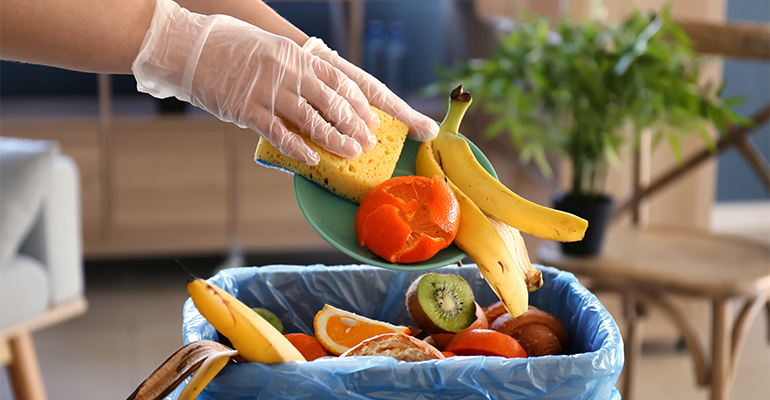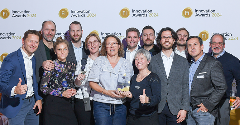News
Producers explore traceability to lower food waste and loss
1 Jul 2025The World Economic Forum has identified traceability technology and tools as emerging anti-loss and waste mechanisms throughout the F&B supply chain.
Responsible for feeding the eight billion people worldwide, today’s global food sector faces increasing demands, ecological degradation, and food insecurity.

The Food and Agriculture Organization (FAO) calculates the amount of food lost or wasted (FLW) annually as approximately one-third, totalling around 1.3 billion tonnes. The FAO estimates the cost of FLW to the global economy as $1 trillion annually, affecting every part of the food industry’s supply chain.
With FLW estimated to reach as much as 2.1 billion tonnes by 2030 and an increased economic burden, better traceability is considered a robust solution.
The latest insights from the World Economic Forum explored the role of traceability in lowering FLW.
Leading traceability developments within the food and beverage (F&B) industry focus on improving transparency, knowledge sharing, and accountability throughout extensive supply chains. Realising and introducing traceability systems with new technologies can help stem FLW, enhance food system efficiency, and result in a more sustainable food system.
Actions to address food loss and waste
In its Sustainable Development Goal 12.3, the United Nations (UN) has set a global 2030 target to halve its per capita global food waste at retail and consumer levels and lower food losses in production and across supply chains.
Regulations and efforts around the globe are tackling upstream food waste, which accumulates before it reaches the retail environment. The US Food and Drug Administration’s (FDA’s) Food Safety Modernisation Act (FSMA) has implemented its final rule of requirements for additional traceability records.
“The industry is moving rapidly toward full food traceability, despite the extension of the enforcement deadline for the FDA’s FSMA 204 food traceability final rule,” Derek Hannum, chief customer officer at ReposiTrak, told Ingredients Network.
The European Union (EU) has also implemented food waste reduction targets. Global voluntary initiatives like the World Resource Institute’s 10x20x30 action also aim to lower food loss before products reach retailers.
Accenture, the World Economic Forum, and UpLink have teamed up to create The Circulars Accelerator Network, which collaborates with startups and industry stakeholders to tackle food loss by utilising traceability and emerging technologies.
The World Economic Forum’s Food Innovation Hubs Global Initiative has launched its Food Innovators Network, connecting over 200 industry players to network and share information. Currently, it is exploring protein innovation and data readiness within food systems.
Major retailers and wholesalers have also made public commitments to food traceability, with programmes requiring more data from suppliers and a faster timeline than the FDA, Hannum said.
“Suppliers, including those on the ingredients side of the supply chain, are proactively preparing their operations for traceability by working with traceability service providers,” Hannum added.
Traceability technology advances
Food traceability enables the sector to track any food or ingredient throughout the entire farm-to-fork path, including production, processing and distribution.
A collection of systems built using various technologies is responsible for tracing foodstuffs. Improving traceability within today’s F&B supply chain currently involves implementing location data, unique IDs such as barcodes or radio frequency identification tags, sensors, and digital systems like blockchain to document and store information.
F&B companies and producers are exploring utilising technology as anti-FLW tools and growing their capabilities by discovering supply chain efficiencies. The Internet of Things (IoT), food sensing, and artificial intelligence (AI) are among the technologies that can deliver more insightful, real-time data to produce actionable insights.
IoT-enabled sensors can enable food industry players to monitor real-time temperature and humidity during storage and transport. They can alert the supply chain to issues and provide time-sensitive interventions to prevent damage.
Food-sensing technologies like hyperspectral imaging can also enhance the accuracy of quality assessments during food inspections. Coupled with AI, this technology can identify issues early and provide predictive shelf-life analytics.
Related news

Oat Barista: Innovation for game-changing beverages
20 Nov 2025
Oat Barista is a clean label, sustainable, and innovative drink base specifically designed to create the perfect foam in one single ingredient.
Read more
Nitrites: Pressure grows on UK to follow EU’s lead
20 Nov 2025
Pressure is growing on the UK to follow the EU’s lead after the bloc revised its regulations on the permitted levels of nitrites and nitrates in cured meats.
Read more
Empowering innovation in fortification and colouration
13 Nov 2025
Divi’s Nutraceuticals offers a large portfolio of innovative, high-quality ingredients for foods, beverages, and supplements, with bespoke solutions and expert support for product success.
Read more
Danone highlights digestive health as potential ‘tipping point’ for food industry
13 Nov 2025
Danone is betting on a food industry “tipping point” that will bloat the market for healthy products, particularly those related to gut health.
Read more
Standing Ovation and Bel scale up casein production from dairy co-products
11 Nov 2025
Foodtech company Standing Ovation has partnered with cheese specialist Bel Group to manufacture dairy serums for industrial-scale casein production via precision fermentation.
Read more
AI attraction means foodtech startups must ‘prove’ rather than ‘promise’
4 Nov 2025
Reports suggest that artificial intelligence (AI) is sucking investment from foodtech and agritech, but investors say the picture is complicated.
Read more
Will postbiotics become the go-to functional ingredient?
3 Nov 2025
Postbiotics show significant promise for the functional foods market due to their safety profile and beneficial bioactive properties, research suggests.
Read more
Meet the finalists of the Fi Europe Innovation Awards 2025
31 Oct 2025
Who made it to the shortlist of the Fi Europe Innovation Awards 2025? Read about the 23 companies making food and drink products healthier and manufacturing processes more efficient.
Read more
Penguin and Club bars no longer classed as chocolate
30 Oct 2025
Penguin and Club bars can no longer be classified as chocolate after the pladis-owned McVitie’s brands turned to cheaper alternatives amid the ongoing cocoa crisis.
Read more
Shorter drying time, sweeter success!
30 Oct 2025
Curious about cost-effective, sustainable and delicious candy making? Stefan Wessel reveals how Avebe’s solutions reduce drying time and energy use by up to 50%.
Read more